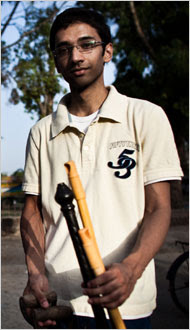
LAHORE, Pakistan — The idea was simple, but in Pakistan, a country full of talk and short on action, it smacked of rebellion.
Shoaib Ahmed, 21, one of the organizers of the group, in Lahore on a recent Sunday.
A group of young Pakistani friends, sick of hearing their families complain about the government, decided to spite them by taking matters into their own hands: every Sunday they would grab shovels, go out into their city, and pick up garbage.
It was a strange thing to do, particularly for such students from elite private schools, who would normally spend Sunday afternoons relaxing in air-conditioned homes.
But the students were inspired by the recent success of the lawyers’ movement, which used a national protest to press the government to reinstate the country’s chief justice, and their rush of public consciousness was irrepressible.
“Everybody keeps blaming the government, but no one actually does anything,” said Shoaib Ahmed, 21, one of the organizers. “So we thought, why don’t we?”
So they got on Facebook and invited all their friends to a Sunday trash picking. Trash, Mr. Ahmed said, “is this most basic thing. It’s not controversial, and you can easily do it.”
Pakistan is a country plagued by problems, like Islamic extremism and poverty. But these young people are another face, a curious new generation that looks skeptically on their parents’ privilege and holds mullahs and military generals in equal contempt.
“The youth of Pakistan wants to change things,” said Shahram Azhar, the lead singer for Laal, a Pakistani rock band, reflecting an attitude that is typical of this rebellious younger generation.
“The reason the Taliban is ruling Swat,” he said referring to a valley north of Islamabad where Islamic extremists took control this year, “is because they are organized. We need to organize, too.”
“The only answer to Pakistan’s problems,” he added, “is a broad-based people’s movement.”
The trash movement, which calls itself Responsible Citizens, does not yet qualify as broad, but it still drew a respectable crowd on a recent Sunday, considering the heat (above 90 degrees) and the time (around 4 p.m.). Mr. Ahmed and his friends were doling out trash bags they had bought for the occasion. About 40 people had gathered. Some were wearing masks. All were carrying shovels.
They set their sights low. The area of operation, Ghalib Market, was modest, a quiet traffic circle in central Lahore encircled by shops, a cricket field and a mosque.
It was not one of the dirtiest parts of the city, but the group felt attached to it, as they had cleaned it in the past, and wanted to see if their actions were having any effect.
The first time they cleaned there was like raking leaves on a windy autumn day.
“We collected, like, 30 bags, but there was no visible difference,” Mr. Ahmed said.
But they talked with local shopkeepers, in a kind of trash outreach, asking them to walk their garbage to the trash bin. Those connections, Mr. Ahmed said, were actually the point of the cleaning — setting an example for others to follow.
“The major problem people have here is that there are no bins,” said Murtaza Khwaja, a 21-year-old medical student.
Actually, the problem was deeper. A long-term cycle of corrupt, weak governments interrupted by military coups has caused Pakistan’s political muscles to atrophy, leaving Pakistani society, particularly its poor, hopeless that it will ever receive the services — education, water, electricity, health — that it so desperately needs.
“People say, ‘This is nice, but things will never change,’ ” Mr. Khwaja said, pointing to a hamburger seller who he said was particularly pessimistic. “There is a hopelessness.”
That is where the trash cleaning comes in. Locals find it perplexing and helpful in equal measures. One enthusiast who met the group on its first outing in March, Muhamed Zahid, has come to every one since. One man passing by in a rickshaw dismounted to help them shovel for a while.
The men in the mosque, on the other hand, were picky, wanting the young people to clean the mosque but not the surrounding area.
Read Complete Article at NYTimes
Pakistanis shine with pride at Dubai Marathon
-
*By Dr Beenish Khalid*
*(Pakistan News & Features Services)*
Pakistan was represented with pride and purpose at the Dubai Marathon,
where three Pakistanis ...
1 week ago








0 Comments:
Post a Comment